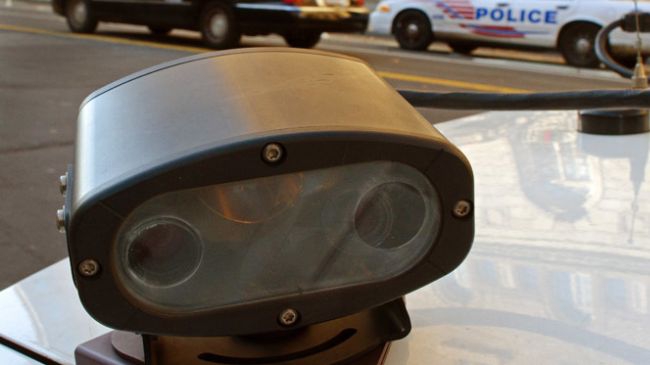 A "License Plate Reader" or LPR, one of two mounted on the trunk of a Metropolotian Police Department(MPD) is seen on a police car in Washington, DC[/caption]
A "License Plate Reader" or LPR, one of two mounted on the trunk of a Metropolotian Police Department(MPD) is seen on a police car in Washington, DC[/caption]The location and movement of American cars are being recorded and archived through police license plate scanners, even if they haven�t done anything wrong, a Freedom of Information Act requests filed by the American Civil Liberties Union has revealed.
In yet another form of U.S. government mass surveillance on its own people, documents obtained through the FOIA show that the new automated plate readers, attached to police cars, bridges, buildings, etc. are capturing images of parked or moving cars and uploading the data to police databases.
The law enforcement departments then keep the data for weeks, years, or sometimes indefinitely, according to The Huffington Post.
"License plate readers are the most pervasive method of location tracking that nobody has heard of," said Catherine Crump, ACLU lawyer and lead author of the report.
"They collect data on millions of Americans, the overwhelming number of whom are entirely innocent of any wrongdoing."
The civil rights group has urged the police departments to erase any records of cars that are not linked to a crime.
The state of Maryland says that troopers could "maintain a normal patrol stance" while capturing up to 7,000 license plate images in a single eight's hour shift.
While the police say they have no intention of building up a location database for people, the ACLU estimates that in the small city of Jersey City, N.J. with a population of 250,000, the police have some 10 million plate images on file over the five year period.
If analyzed, this data can obviously track nearly all citizen movements according to the ACLU.
Crump said the growth of license plate readers echoes the controversial National Security Agency surveillance programs.
"It raises the same question as the NSA controversy: do we want to live in a world where the government makes a record of everything we do - because that's what's being created by the growth of databases linked to license plate readers."
Last month, American whistleblower Edward Snowden blew the lid on massive surveillance by the NSA including two major spying programs, one for gathering U.S. phone records and another, codenamed PRISM, for tracking the use of US-based web servers by American citizens and other nationals.
By Press TV
The Iran Project is not responsible for the content of quoted articles.











